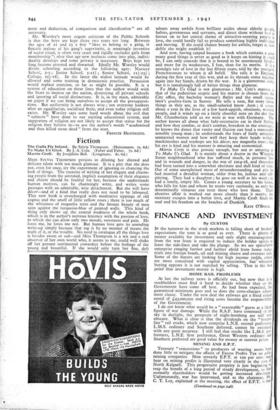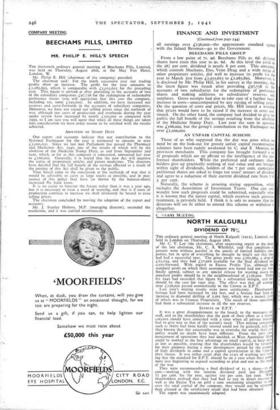FINANCE AND INVESTMENT
By CUSTOS
IF the turnover in the stock markets is falling short of brokers' expectations the tone is as good as ever. There is plenty of money available for investment and only slight encouragement from the war front is required to induce the bolder spirits to leave the side-lines and take the plunge. So we see speculative enterprise ranging further and further afield from home indus- trials into foreign bonds, oil and mining shares and overseas rails. Some of the buyers are looking for high income yields, others are more concerned with capital appreciation, but wherever buying appears it is not matched by selling. That is the best proof that investment morale is high.
HOME RAIL PROBLEMS
At last the railway news is officially out, but now that it is stockholders must find it hard to decide whether they or the Government have come off best. As had been expected, the guaranteed minimum goes and so does the costs-charges adjust- ment clause. Under the new deal the railways get a fixed annual rental of £43,000,000 and rising costs become the responsibility of the Government.
I do not know what would be a " reasonable " guess at a likely figure of war damage. While the R.A.F. have command of the sky in daylight, the prospects of night-bombing are still very obscure. What is clear is that the dividends on the " border- line" rail stocks, which now comprise L.N.E. second preference, L.M.S. ordinary and Southern deferred, cannot be estimated with any great accuracy. I still feel that stocks like L.M.S. pre- ferences, L.N.E. first preference, Great Western ordinary and Southern preferred are good value for money at current prices.
MINING AND E.P.T.
Treasury " concessions " to producers of wasting assets have done little to mitigate the effects of Excess Profits Tax on gold- mining companies. How severely E.P.T. at too per cent. mal bear on mining profits is illustrated very clearly in the case d North Kalgurli. This progressive property is just beginning la reap the benefit of a long period of steady development, so that normally shareholders would - be getting increased dividends. Unfortunately, war has intervened, and as the chairman, Mr. C. T. Ley, explained at the meeting, the effect of E.P.T. is that (Continued on page 246)
FINANCE AND INVESTMENT
(Continued from page 244) all earnings over L136,000—the approximate standard agreed with the Inland Revenue—go to the Government.
BEECHAMS PILLS GROUP
From a low point of 7s. 9d. Beechams Pills 2s. 6d. deferred shares have risen this year to 9s. 6d. At this level the yield oa the 281 per cent. dividend is nearly 8 per cent. This company, which controls Macleans, Eno, Veno Drug and a wide range of other proprietary articles, did well to increase its profit for the year to March 31st from £1,055,615 to £1,085,893. Moreover, it is disclosed by Mr. Philip Hill, in his survey at the meeting, that the latest figure was struck after providing £97,758 in the accounts of two subsidiaries for the redemption of preference shares and making additions to subsidiaries' reserves and surpluses. Gross receipts had also to take care of a further heavy increase in costs—unaccompanied by any raising of selling prices. On the question of costs and prices, Mr. Hill issued a warning that prices would have to be raised if the increase in costs con- tinued. On the other hand, the company had decided to give the public the full benefit of the savings resulting from the abolition of the Medicine Stamp Duty. Last year the sum in question was £166,000, but the group's contribution to the Exchequer was over LI,000,000.
AN UNFAIR CAPITAL SCHEME
Those of us who supposed that the day was gone when we need be on the look-out for grossly unfair capital reconstruction schemes have been rudely awakened by C. and E Morton, the provision merchants. This company has brought forward a set of proposals which are an affront to the intelligence of the pre- ference shareholders. While the preferred and ordinary share- holders give up practically nothing of real value and are brought within sight of dividends, holders of the 7 per cent. cumulative preference shares are asked to forgo ten years' arrears of dividend and agree to a reduction of their current dividend rate from 7 to 5 per cent.
Naturally, the scheme is arousing swing opposition, which includes the Association of Investment Trusts. One can only wonder how such proposals could be submitted, especially when it is known that the junior capital, which receives such generous treatment, is privately held. I think it is safe to assume that the directors will see fit either to amend this scheme or withdraw it altogether.



























 Previous page
Previous page